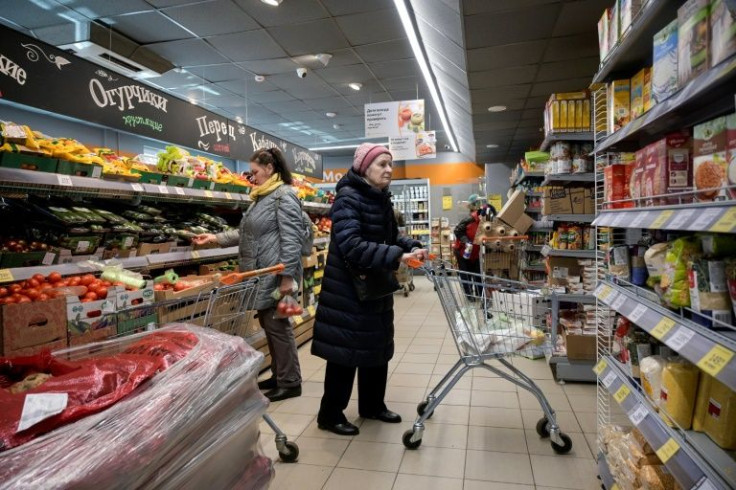Russia Says Paid Dollar Debt In Rubles Amid Default Fears
Russia said Wednesday it had been forced to make foreign debt payments on dollar-denominated bonds in rubles, raising the prospect of a potential default amid unprecedented Western sanctions over the Ukraine conflict.
The announcement came on the 42nd day of Russia's military campaign in pro-Western Ukraine, with thousands killed and more than 11 million having fled their homes or the country in the worst refugee crisis in Europe since World War II.
The West has pummelled Russia with debilitating sanctions since President Vladimir Putin sent troops into Ukraine on February 24.
On Wednesday, the United States announced sanctions against Putin's two adult daughters and "full blocking" sanctions on Russia's largest public and private financial institutions, Sberbank and Alfa Bank. It also said all new US investment in Russia was now prohibited.
The Russian finance ministry said earlier in the day that it had been forced to repay $649.2 million to foreign debt-holders in rubles after a correspondent bank refused to execute payment instructions.
Ratings agencies have downgraded Russia and warned that payments of dollar-denominated debt in local currency would constitute a sovereign default, the country's first in decades.
The United States this week barred Russia from making debt payments using funds held at American banks, ramping up the economic pain in Moscow.
"A foreign correspondent bank refused to execute instructions for the payment" of debt on two eurobonds on April 4, the Russian finance ministry said.
"In order to fulfil the state debt obligations," the ministry said it "was forced to call upon a Russian financial institution to make the necessary payments".
The finance ministry did not specify whether the ruble payment had been accepted.
"If Russia attempts to transfer payment in rubles -- as it has warned in the past -- via a special payment procedure set up in mid-March for bonds that do not have a ruble repayment clause, this will constitute default," said Elina Ribakova, deputy chief economist at the Institute of International Finance, a US-headquartered financial industry association.
The Kremlin denied suggestions that Russia could default on foreign debt payments.
"Russia has all the necessary resources to service its debts," Kremlin spokesman Dmitry Peskov told reporters.
"There are no grounds for a real default."
Timothy Ash, an emerging markets strategist at BlueBay Asset Management, said, however, that it was hard to see Russia avoiding a sovereign default.

"Putin is impoverishing Russia for years to come," he said in a note to clients.
"Default might not crash Russian markets and the economy immediately but will have devastating longer term consequences."
Russia last missed payments on domestic, ruble-denominated debt in 1998, but last defaulted on its foreign currency debt in 1918 under Bolshevik leader Vladimir Lenin.
In recent years, Moscow amassed about $600 billion in foreign currency reserves, including gold, largely from oil and natural gas sales.
The government has about $40 billion in dollar- or euro-denominated debt, though only half of that is held by foreign creditors.
The sanctions also sparked an exodus from Russia of hundreds of foreign companies.
US officials expect the sanctions to plunge Russia, which has heavily relied on imports of manufacturing equipment and consumer goods, into deep recession.
Ordinary Russians have been bracing for tough times, stocking up on food and other supplies as inflation soars.
Prices for consumer goods have risen on average of almost 10 percent since the start of the year, the national statistics agency Rosstat said Wednesday, while for some items it is much higher.
Olesya Ogiyeva, a 42-year-old factory worker in Russia's second largest city of Saint Petersburg, complained recent price hikes were "eye-popping."
"You come home, take out your purchases and realise that you've basically bought nothing, because everything is very expensive," she told AFP.
New car sales sank almost 63 percent in Russia in March year-on-year, the Association of European Businesses reported Wednesday.
Rosstat said prices for new cars of foreign makes rose over 30 percent since the end of last year, while Russian-make cars rose over 20 percent.
Andrei Yakovlev, director of the Institute for Industrial and Market Studies at Moscow's Higher School of Economics, said the worst economic impact of the sanctions was still to come.
"Disruption to component supplies across all industries will begin in about a month or a month and a half," Yakovlev told AFP.
"It is possible that a large number of enterprises will stop working because of this in May," he said, adding that eventually tens or even hundreds of thousands of people will stop receiving wages.
© Copyright AFP {{Year}}. All rights reserved.





















